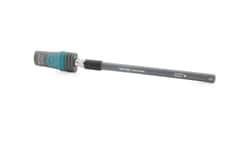Learn More
Description
- Range (concentration): 1 to 40,000 mg/L (or ppm)
- Interfering ions: Pb2+, Hg2+, Si2+, Cu2+, Ni2+, NH3, Na+, Li+, K+, Ba2+, Zn2+, Mg2+
- pH range: 2 to 8 (no pH compensation)
- Electrode slope: 26 ±2 mV/decade at 25°C
- Electrode resistance: 100 MΩ
- Minimum sample size: must be submerged 2.8 cm (1.1 in.)
- Includes:
- Go Direct ISE Amplifier attached to a Go Direct Calcium Ion-Selective Electrode BNC
- Micro USB cable
- 30 mL bottle of High Standard solution with SDS (1000 mg/L Ca2+)
- 30 mL bottle of Low Standard solution with SDS (10 mg/L Ca2+)
- Short-Term ISE Soaking Bottle
- Robust rechargeable battery offers long battery life and provides always-ready operation when using the sensor wirelessly
- Data from the wireless Go Direct Calcium Ion-Selective Electrode can give a good indication of the hardness of water.
- The concentration of calcium is also used as an endpoint indicator in EDTA-Ca/Mg hard water titrations.
- The versatile BNC connector allows students to easily replace the electrode when it expires or becomes damaged. You need only replace the electrode and not the entire sensor—lowering your overall equipment costs.
- Has a combination-style, non-refillable, gel-filled electrode.
Specifications
Specifications
| Calibration | Calibrated 10 to 1000 mg/L |
| Grade | High School and College |
| Interface | Bluetooth or USB |
| Warranty | 5 Year Limited |
| For Use With (Application) | Graphical Analysis 4 or LabQuest App |
| Accuracy | ±10% of full scale |
| Range | ±1000 mV |
| Temperature Range (Metric) | 0°C to 40°C |
Safety and Handling
By clicking Submit, you acknowledge that you may be contacted by Fisher Scientific in regards to the feedback you have provided in this form. We will not share your information for any other purposes. All contact information provided shall also be maintained in accordance with our Privacy Policy.




